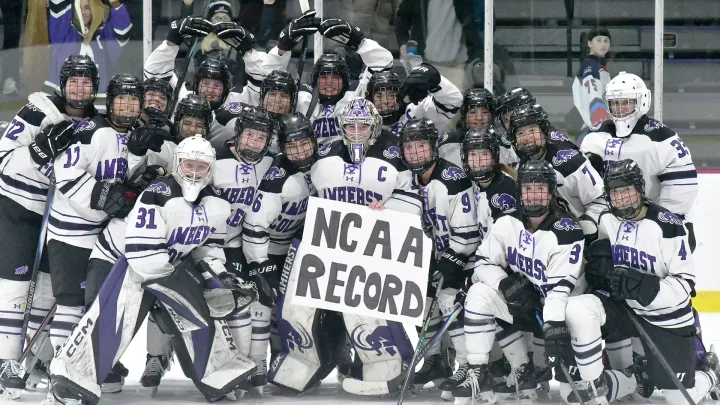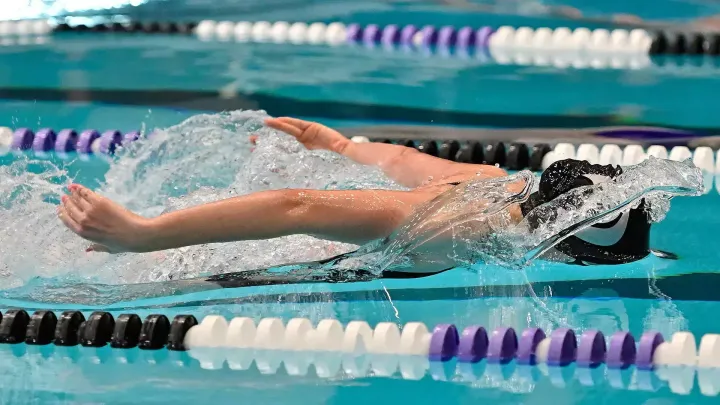Rowing Team Dominates Fall Season
Staff Writer Helena Henson ’28 reflects on the recent success of the Club Crew team as they set a school record and beat Division I programs.
On Oct. 18, the Amherst crew team traveled to Cambridge, Massachusetts to compete in the prestigious Head of the Charles Regatta (HOCR). This year, one Amherst women’s boat qualified for the HOCR, which is the world’s largest three day rowing competition, hosting international, collegiate, and high school rowers alike. The team of Nora Lowe ’26 (as coxswain), Emma Strawbridge ’25, Elena Rawlinson ’26, Isabella DePreist-Sullivan ’27, and Ellen Wolstenholme ’27 placed eighth out of 40 competitors. This performance set an Amherst record in time for the course and marked the highest finish by an Amherst boat at the HOCR (the women’s team placed 13th in 2015).
“It’s kind of hard to describe how significant that is, but I hope it’s clear that we have never been that good before. So it’s super exciting,” reflected Strawbridge on their boat’s achievement. “We beat all of the [Division] III teams in our category, and we beat a couple of [Division] I teams.” Strawbridge added that they “felt like [they] won a bronze medal at the Olympics” during the boat’s exciting finish.
The next weekend, in the exclusively scholastic Wormtown Chase Regata, Amherst raced six boats: three women’s 4+ boats (including the HOCR winner), one men’s 8+ boat, and two novice 8+ boats. In their debuts, the women’s novice team placed second, and the men’s novice team placed fifth. The women’s ‘A’ team dominated again, winning their category and beating all three boats from Holy Cross — another Division I program.
Crew is the oldest intercollegiate sport in the United States and Amherst College has long been a part of this tradition. The college’s competitive rowing program began in the 1860s and evolved into a powerful force in the sport. In 1872, the team won a national championship. A homage to this accomplishment can be spotted in the Russ Wing at Valentine Dining Hall, with the crew’s practice shell that hangs from the rafters. After dissolving shortly following their championship, the varsity program reemerged in 1948. In the early 1990s, however, the team transitioned to a club sport.
“It makes things a little complicated for us,” explained Strawbridge on the club status of the team. “Funding a crew team is expensive, boats are expensive, so we do a lot of fundraising.” The restructuring of the program allowed for the team to establish an endowment and increase their budget to a degree not permitted for varsity athletics.
“It means we don’t recruit, and that means we get who we get, which I think is awesome,” commented Strawbridge. “We have a really great group of people who just really want to be there, but it also means we are starting from scratch. Pretty much everyone on the team doesn’t know how to row and that’s great because it means they’re gonna learn … It’s really exciting to have a mix of people who want to join this sport for the love of the sport. Or for those who just want to try it out and for whom rowing becomes a really transformative experience.”
“It’s really exciting and inviting,” first-time rower Maya Roberts ’28 reflected. “They teach you by going through everything really slowly and it’s funny to laugh at your mistakes. It’s not an environment where you have to be perfect all the time, and of course, we strive to get better, but at the beginning, it’s just fun and it’s really enjoyable to see yourself grow.” Roberts added that witnessing the success of the team has been “inspirational because you wanna be them. To see their faces, even the teams when they don’t get first place as they cross the line, they’re so excited, and you wanna be a part of that atmosphere; it draws you in.”
After a dominant fall, the crew team will look to train during the winter ahead of their spring season. “We’re looking to defend the titles,” Strawbridge commented on the team’s goals for the next season. In the New England Rowing Championship Regatta last spring, both the women’s first and second 4+ teams won gold, while the third 4+ boat won bronze. “So we’re hoping to bring back at least those medals if not higher medals.”
Strawbridge also emphasized that the team is “mostly hoping that the novices will get stronger. Not that they’re not strong to begin with, but we’re really hoping that they’ll be able to develop into strong and fast teams. That’s what keeps the team going. We can’t do anything without our new people liking the sport and wanting to do that.”




Comments ()